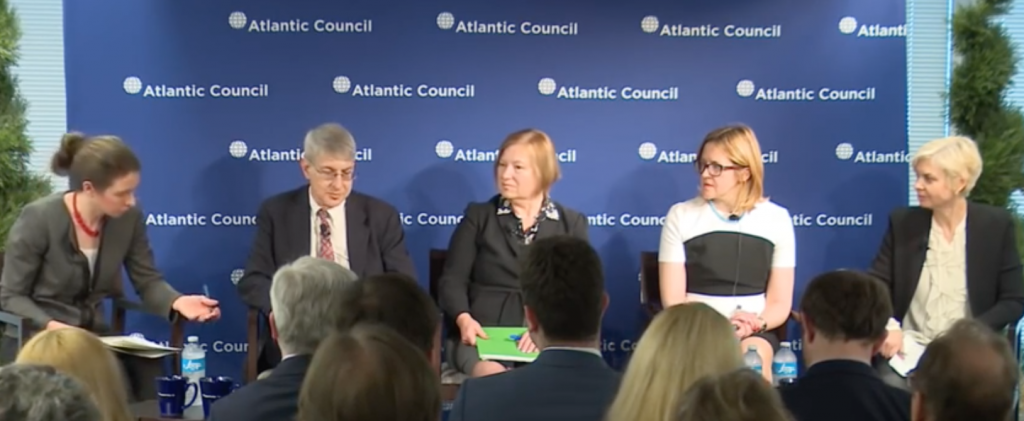On February 7, 2017, The Atlantic Council held a panel to discuss the newly developed independent Russian-language news Network. The scope of the panel was to debate the democratic problems in the region. The panelists are Dr. Alina Polyakova (Deputy Director, Dinu Particiu Eurasia Center, Atlantic Council), Mr. John Lansing (Chief Executive Officer, Broadcasting Board of Governors), Mr. Thomas Kent (President, Radio Free Europe/Radio Liberty), Ms. Amanda Bennett (Director, Vote for America). Ms. Daisy Sindelar (Director, Current Time, Radio Free Europe/Radio Liberty) Ms. Irina Van Dusen (Director, Russian Services, Voice of America)
John Lansing set five priorities for the agency’s’ Broadcasting Board of Governors to maximize the agility efficiency and impact of the network and to enable the company to more efficiently address the rapidly growing media environment. The priorities were as follows; a dramatic shift to social mobile and digital platforms, enhancement of the strategic cooperation of the 5 BBG networks networks, increasing the collaboration in the International Cooperation Council, a more strategic targeting of resources to areas with strategical importance for Foreign Policy issues regarding regions such as Russia and its periphery, China, Iran, Cuba and CVC. Further the need to increase the curation of content so the best use of resources to get the most important news on air, and most importantly to measure their success beyond the reach of the media, but the impact that the media has on those that they do reach. Over the last week, Current Times media reach is at 270 million on a weekly basis, which proves the progress made on the five domains.
Current time focuses on the need for Russian speakers to address themselves in the post-Soviet region, and for the Russian audience to have professional, objective and real access to information. He believes that it is the best defense against falsehood. Current time is not propaganda nor a propaganda fighter but an independent news network.
Thomas Kent sustains that the news channel is trying to get young viewers and young professionals. There is a lot of curiosity, and many Russians are not satisfied with what they see in the media. One of the ways in which they build trust is by airing live coverage – which cannot be manipulated. They line up different views and different coverages of the same event so that people can make a comparison from one to the other. Further, they also try to talk slower and in more detail.
Amanda Bennet states that one can fight Russian disinformation with facts. She does not believe there is a pushback, or that people gave up on the truth. The surveys are showing that the Russian people are not satisfied with their news outlets. You have a feeling that people understand that they are being lied to. She believes it ‘s hard to get the truth out, as it is hard to push back on narratives. The best solution is just to change the description. She believes that the basis on a lot of satire is a good way to get the truth out. It is a very powerful thing.
There is a need for international broadcasting. The organization is prepared to grow as much as possible, and it is possible all over the world. Russian speakers are extremely interested in what’s happening the US. There is a need for help with medicine, how to get in an American college, technology, and entrepreneurship and even the want to know more regarding Foreign Policy, such as NATO plans. What people want to know is what are citizens like me doing in that area.
Daisy Sindelar sustains that despite Radio for Europe, they have been moving aggressively to video and TV. Of the 18 language service, most of them are producing daily TV content. Current time is a 24h channel, which is how they are different. They are hoping to expand on some people which this program can grasp. There is a plan to expand beyond the current countries that are taking part. The channel promotes democracy, the rule of law, human rights and freedom of speech, covering the heavier news than other channels.
Irina Van Dues updates on the fact that current News has bureaus in several cities. They do live to report from New York, Los Angeles, San Francisco, Dallas. The focus on the news channel is to expand and give the audience a broad picture of what American life is and how people struggle, what the actual meaning of democracy is. The organization has a strong digital presence, and they have the ability to get feedback and see what people are interested in. Live reporting is very popular, and they are expanding into live streaming on the channel as well as the website, as well as by doing important events with translations, followed by comments.
Current News is encouraging feedback through social media interaction, although there are people who still write letters. Some people think that one story demonstrates objectivity although other individuals who don’t trust in the institutions believe that the news faces. The show is doing very well in Ukraine; they are seeing an honest assessment of ordinary people just living across from them.
For more information, please visit: http://www.atlanticcouncil.org/events/webcasts/current-time-the-independent-russian-language-news-network
Synthesis by: Patricia Besciu, all ideas are those of speakers, no personal opinions have been included.
